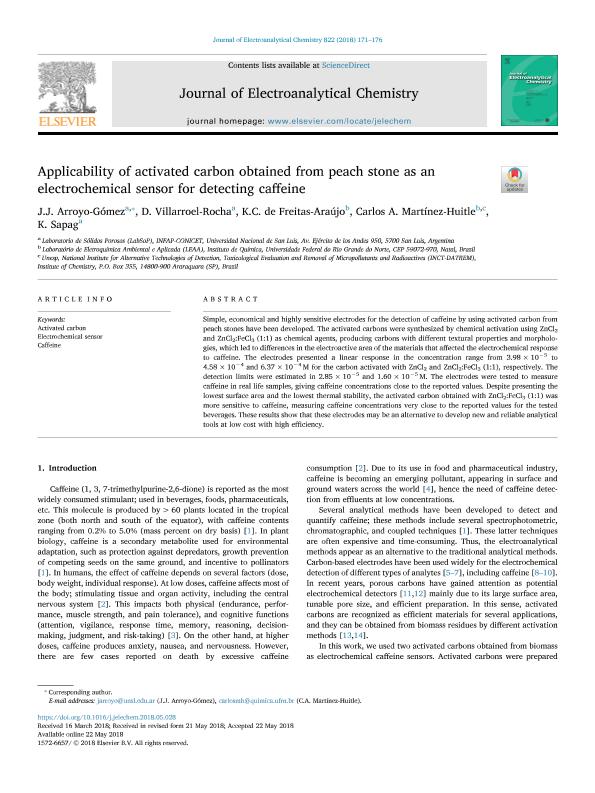Artículo
Applicability of activated carbon obtained from peach stone as an electrochemical sensor for detecting caffeine
Arroyo Gomez, Jose Joaquin ; Villarroel Rocha, Dimar
; Villarroel Rocha, Dimar ; Araújo, K.C. de Freitas; Martínez Huitle, Carlos A.; Sapag, Manuel Karim
; Araújo, K.C. de Freitas; Martínez Huitle, Carlos A.; Sapag, Manuel Karim
 ; Villarroel Rocha, Dimar
; Villarroel Rocha, Dimar ; Araújo, K.C. de Freitas; Martínez Huitle, Carlos A.; Sapag, Manuel Karim
; Araújo, K.C. de Freitas; Martínez Huitle, Carlos A.; Sapag, Manuel Karim
Fecha de publicación:
08/2018
Editorial:
Elsevier Science Sa
Revista:
Journal of Electroanalytical Chemistry
ISSN:
1572-6657
Idioma:
Inglés
Tipo de recurso:
Artículo publicado
Clasificación temática:
Resumen
Simple, economical and highly sensitive electrodes for the detection of caffeine by using activated carbon from peach stones have been developed. The activated carbons were synthesized by chemical activation using ZnCl2 and ZnCl2:FeCl3 (1:1) as chemical agents, producing carbons with different textural properties and morphologies, which led to differences in the electroactive area of the materials that affected the electrochemical response to caffeine. The electrodes presented a linear response in the concentration range from 3.98 × 10−5 to 4.58 × 10−4 and 6.37 × 10−4 M for the carbon activated with ZnCl2 and ZnCl2:FeCl3 (1:1), respectively. The detection limits were estimated in 2.85 × 10−5 and 1.60 × 10−5 M. The electrodes were tested to measure caffeine in real life samples, giving caffeine concentrations close to the reported values. Despite presenting the lowest surface area and the lowest thermal stability, the activated carbon obtained with ZnCl2:FeCl3 (1:1) was more sensitive to caffeine, measuring caffeine concentrations very close to the reported values for the tested beverages. These results show that these electrodes may be an alternative to develop new and reliable analytical tools at low cost with high efficiency.
Palabras clave:
ACTIVATED CARBON
,
CAFFEINE
,
ELECTROCHEMICAL SENSOR
Archivos asociados
Licencia
Identificadores
Colecciones
Articulos(INFAP)
Articulos de INST. DE FISICA APLICADA "DR. JORGE ANDRES ZGRABLICH"
Articulos de INST. DE FISICA APLICADA "DR. JORGE ANDRES ZGRABLICH"
Citación
Arroyo Gomez, Jose Joaquin; Villarroel Rocha, Dimar; Araújo, K.C. de Freitas; Martínez Huitle, Carlos A.; Sapag, Manuel Karim; Applicability of activated carbon obtained from peach stone as an electrochemical sensor for detecting caffeine; Elsevier Science Sa; Journal of Electroanalytical Chemistry; 822; 8-2018; 171-176
Compartir
Altmétricas



